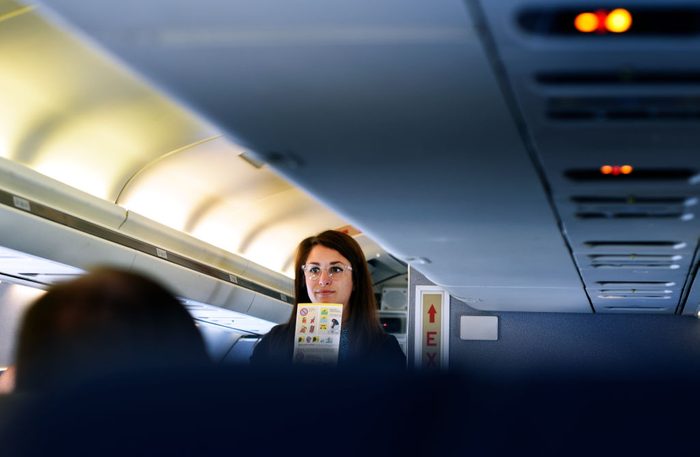
The dos and don’ts of flying
It seems like every day there’s a new viral video showing passengers getting kicked off airplanes for all types of unruly, rude and sometimes violent behaviors. But one thing remains constant in all these crazy scenes: how polite and calm the flight attendants remain. Seeing these videos may make you feel even more motivated to be a polite and helpful passenger when you fly.
“This is a great instinct, and we definitely appreciate it when passengers go out of their way to be helpful … usually,” says Tania M., a flight attendant with nearly 20 years of experience. After all, like most people who work with the public, flight attendants love when you are considerate, follow proper etiquette and skip the annoying comments. Bonus points if you know what to do on a flight. In fact, these are some of the first things flight attendants notice about you.
So where do things go awry? When passengers’ good intentions to “help” end up making a flight attendant’s job harder. This can happen when passengers don’t understand the protocols the cabin crew must follow on board, or because they’re looking at things from the wrong perspective. If you’re wondering whether you’ve ever accidentally crossed the line, you’re about to find out. We went straight to the source and asked flight attendants which seemingly polite habits actually drive them nuts—and what truly helpful passengers should do instead.
Get Reader’s Digest’s Read Up newsletter for more travel tips, tech, humor, cleaning and fun facts all week long.
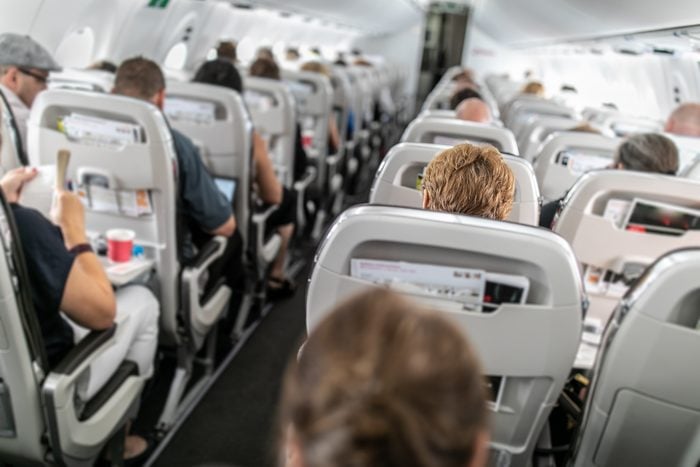
Enforcing the rules for other passengers
It can feel tempting or even righteous to ensure everyone is following the rules of flying, especially if another passenger is doing something that is irritating, mean or dangerous. You may also think that by stepping in, you’ll be helping or even protecting the flight attendants. But you should resist the urge to intervene. “This is something I’ve seen change a lot for flight attendants since the COVID pandemic, especially when it comes to telling other passengers to wear a mask or not to cough,” says Ethan S., a flight attendant who has been flying internationally for six years. But regardless of what rule you think (or even know) another passenger is breaking, it isn’t your job to call them out on it, and doing so can cause conflict and fights.
Do this instead: Politely and discreetly alert the flight attendant to the situation, and then let them choose how they want to deal with the infraction.
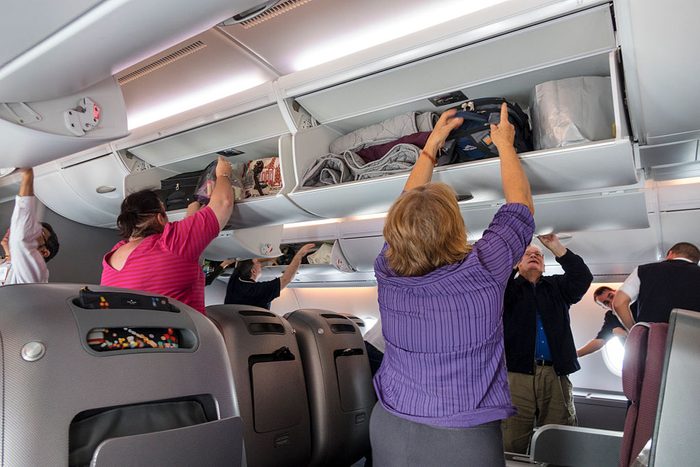
Organizing the overhead bins
“I’m on the smaller side, so I often have passengers offer to help me lift bags or arrange the overhead compartments,” says Erica L., a flight attendant who just finished her second year with a major U.S. airline. “This is fine if you’re handling your own luggage, but I really can’t allow you to move around other people’s stuff.”
She says she’s had passengers take items directly out of her hands, go through and “organize” all the carry-ons, shut all the compartments to “save” them, and remove bags they think shouldn’t have been allowed on. Not only does this anger other passengers, but it can also make it nearly impossible for passengers and crew to find their things when disembarking.
Do this instead: Quickly stow your own items, and then stay out of the way and let the cabin crew do their job. Trust us … and them—they will figure it out without your help!
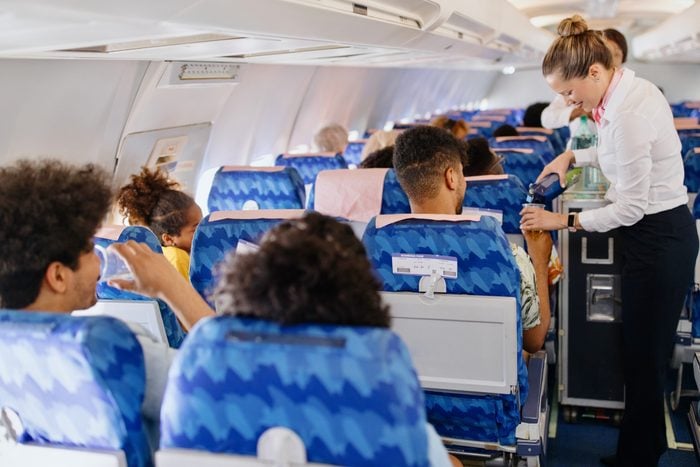
Tugging their sleeve to get their attention
Instead of calling out, some passengers think it’s more polite to gently tug on a flight attendant’s sleeve or elbow to get their attention—especially if their neighbor is sleeping or if the plane is very quiet, says Ethan. On the upside, at least it’s not whistling or snapping their fingers, which is very rude. (“We’re not dogs!” he says). But even if you’re gentle and trying to be polite, most flight attendants prefer not to be touched at all.
Do this instead: “Use the call button—this is what it exists for,” Ethan says. “It’s not loud or disruptive, and it will get our attention.” A quiet “Excuse me, sir” or “Pardon me, ma’am” with a little wave also works, he adds. The same rules apply, by the way, when it comes to being polite to restaurant staffers.
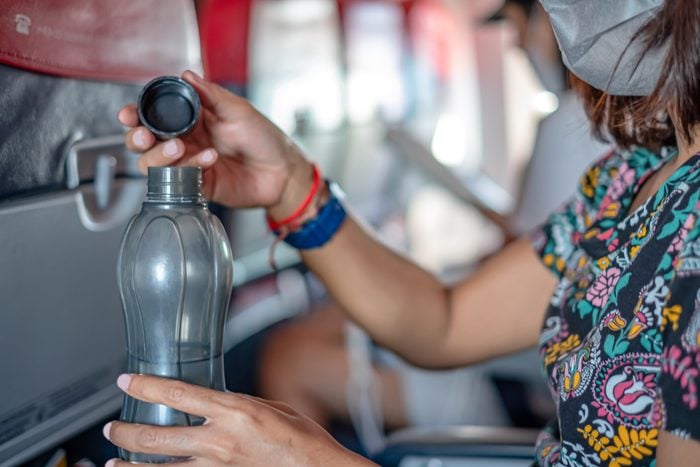
Asking them to fill your reusable water bottle
Single-use plastics are a huge environmental problem, and it’s commendable that you’re doing your part to be responsible by bringing your own reusable water bottle. It’s also good for the flight attendants, reducing the waste they have to take care of. What’s not a good idea? Asking the flight attendant to fill up your 32-ouncer. “People often don’t realize that we are ‘catered’ a limited amount of water on the plane, and that’s all there is,” says Tania. “We simply can’t fill up everyone’s water bottle, or there wouldn’t be enough to go around.”
Do this instead: Fill up your water bottle right before boarding (but after security). It’s fine to ask for water during drink service, but don’t expect more than the normal serving size.
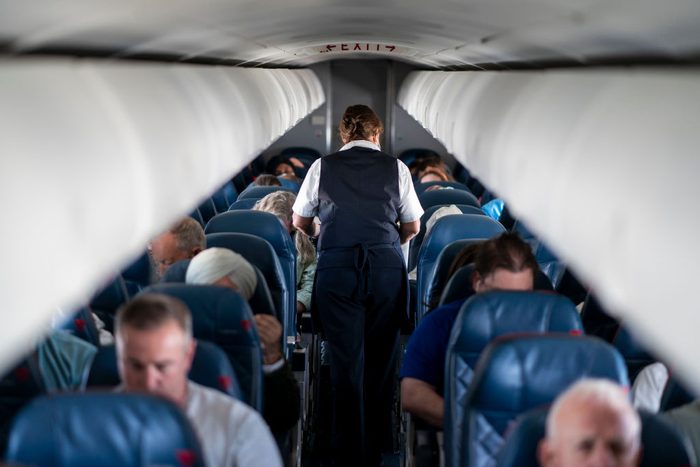
Serving yourself from the drink cart
If the flight attendant seems busy juggling all the drink orders and the cart is right in front of you, you might try helping yourself to save them a little bit of work. Let us stop you right there. “We have to push the beverage cart ahead of us down the aisle, which means it will get to your row before I do,” Tania says. “Sometimes people think that I ‘forgot’ to get their order and they’ll reach into the cart. Or sometimes they see what they want and think it’s faster to grab it themselves.” But not only does this mess up the cabin crew’s system for serving food and drinks—it also risks contaminating the cart contents with your dirty fingers and makes your neighbors upset, since they might be wondering why you got a drink 10 minutes before they did. “It just causes chaos and confusion,” Tania explains.
Do this instead: Patience is the name of the game. Politely tell the flight attendant what you would like, and wait for them to hand it to you.
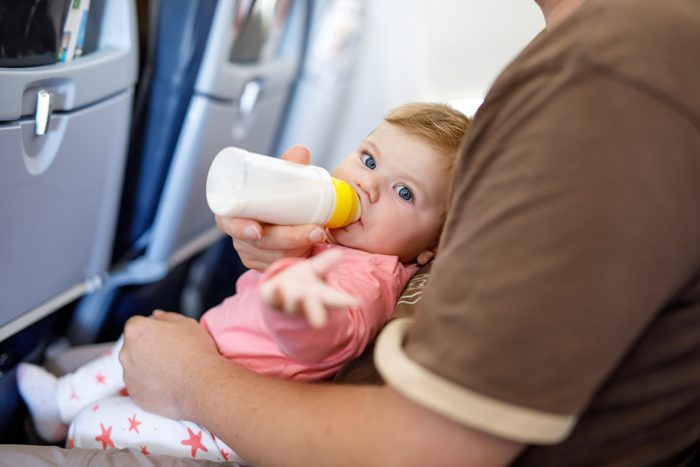
Handing them a dirty diaper to throw away
You should never change your baby at your seat (use the lavatory), but flight attendants say they see this one happening a lot when parents are flying with kids, especially if the diaper is “just wet” or the line to the lavatory is long. Of course, if you’ve done this, now you have to do something with that dirty diaper, and your instinct may be to hand it to the flight attendant, like you might do with other trash. But hold on …
“No dirty diapers, no bloody nose tissues, no diabetic needles and nothing else that might have bodily fluids on it—that’s all hazardous waste. And gross,” says Mac A., a flight attendant with 15 years of experience. “The worst is when people try and hand it directly to me … into my hands. Just no!”
Do this instead: Dispose of dirty diapers or anything else that might be contaminated by putting it in the lavatory’s garbage. If you are carrying medication that requires needles, you should bring your own TSA-approved sharps container and keep the used ones in there until you can properly dispose of them.
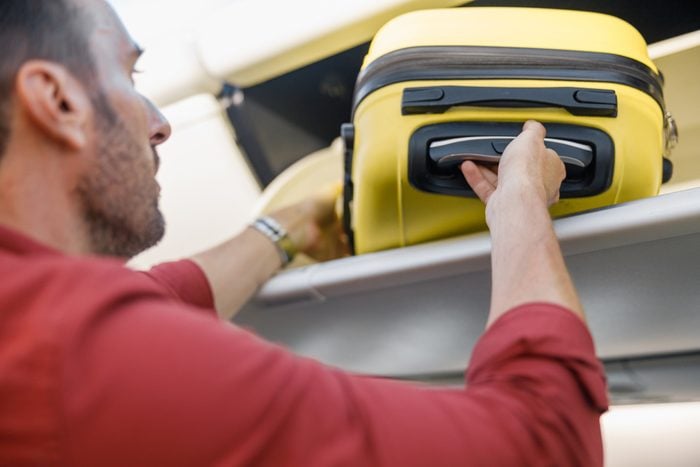
Stowing your carry-on too carefully
“We really appreciate passengers who are prepared and careful when boarding the aircraft, including stowing their bags properly,” says Erica. “But you can go overboard with it, trying to find just the right spot and position, tucking everything in and securing it just so.” If you take a long time to stow your luggage, it can delay the flight and cause frustration, so be as efficient as possible. “I once had a passenger who insisted that no one else’s luggage touch hers at all and was trying to hold open a space next to it with her arm,” she says. “We compromised by putting an airline blanket in between her bag and the next one.”
Do this instead: Be prepared to stow your luggage as soon as you board. This means tucking in loose straps, closing zippers, putting away items you’ve taken out, removing items you’ll need in your seat and folding in the wheels and handle (if your carry-on has those) before you get on the plane. If you’re unsure about how to fit your luggage or are worried about fragile or precious cargo, ask the flight attendant how they would prefer you store it.
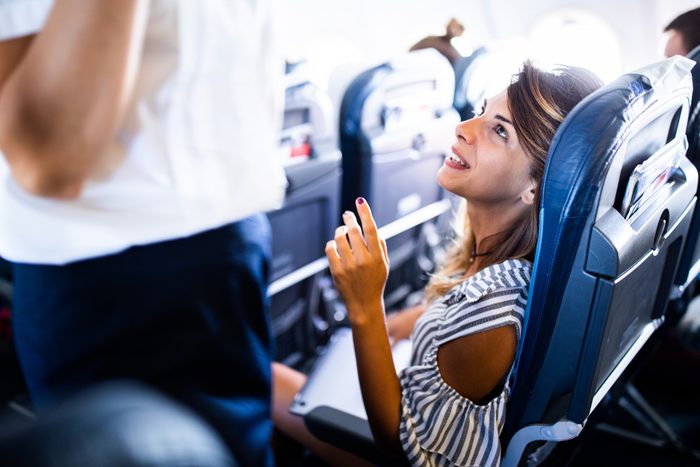
Calling them over to chat
“I’m always glad when passengers see me as a reliable source of information and feel comfortable asking me for help, but you have to remember that we’re there to help everyone,” says Ethan. He says sometimes passengers call him over to talk, saying they don’t want him to “get bored.” One of the flight-attendant secrets you don’t know? “We’re actually quite busy the whole flight,” he explains. “There are a lot of things we need to get done that you may not be aware of.”
Do this instead: While it’s important to alert the flight attendants if you need help or have a question, constantly pressing the call button for non-urgent matters can be annoying and disruptive to their work.
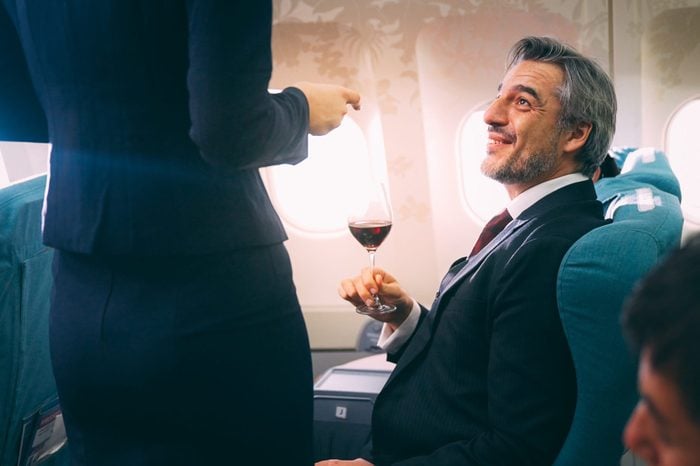
Flirting with them
Exchanging sultry looks (and phone numbers) may seem like the perfect meet-cute, right out of a Hollywood movie, but in real life, flirting with your flight attendant is more likely to feel annoying, icky or even threatening. “I’m actually shocked at how often this happens, and it’s even more frustrating when the person insists that I take their flirtations as a compliment,” says Erica. “I’m being nice to you because it’s my job to be nice, not because I’m into you.” Tania adds that there is a long-standing myth that flight attendants are “easy” or sexually promiscuous, which leads some passengers to proposition the flight attendant, since that’s supposedly what they “really want.”
Do this instead: Treat all flight attendants like the professionals they are, and never hit on them while they’re working. If you really feel like there’s a connection, you can offer your business card or a piece of paper with your number at the end of the flight and leave it up to them to call you—but even this goes wrong more often than it goes right, adds Erica. However, if you are browsing Tinder and see them nearby on the app, feel free to swipe right and see what happens!
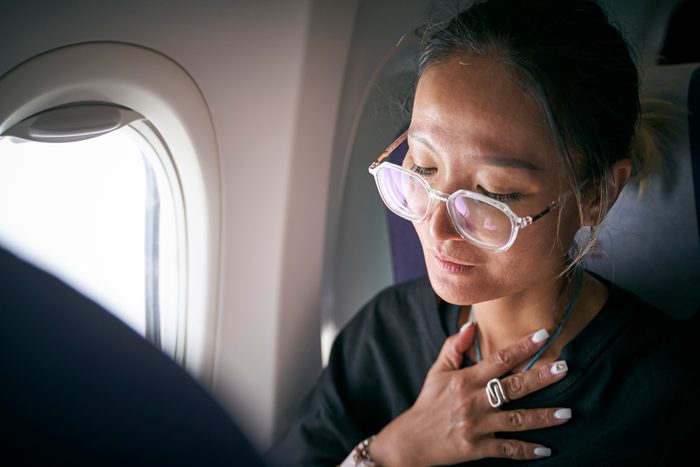
Not letting them know you’re terrified of flying
You may not want to bother your flight attendant about your fear of flying—after all, you know how much they have to do, especially during takeoff and landing. But your feelings are not a bother, and flight attendants know a ton of techniques to help you calm down; they just need to know you need the help. “Sometimes I’ll see someone silently sobbing into their sleeve, and it breaks my heart,” Mac says. “I usually ask if they’re OK, but if you have a severe fear of flying, please let us know.”
Do this instead: Let your flight attendant know if you’re experiencing a lot of panic, fear or anxiety, before you take off or at any time during the flight. “We can bring you a paper bag to breathe in, distract you with jokes, explain how planes are built to handle turbulence and lightning strikes, show you interesting airplane features, play a game with you or hold your hand,” Mac says, adding that his favorite “trick” is teaching people how to make origami cranes. “They concentrate so hard on getting the folds right that they forget about everything else.”
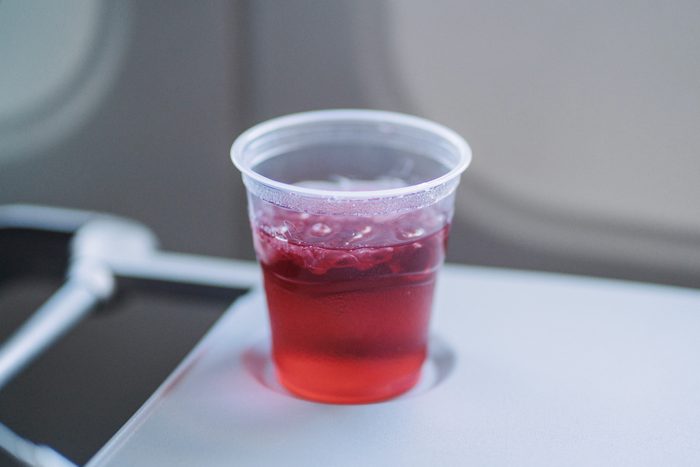
Throwing away other people’s trash
One of the best things you can do to help a flight attendant is to clean up your own mess by gathering all your trash and disposing of it properly, says Mac. What’s not as helpful? Picking up your neighbor’s trash and throwing it away too. “The intention is good, but we’ve had people get things thrown away like meeting notes, snacks they weren’t done eating and, even once, someone’s wedding ring,” he says. Best-case scenario: The flight attendant has to fish it out of the bag and hand it back. Worst case: They have to dig through all the bags of garbage, holding up the plane and not allowing anyone to disembark until they find it.
Do this instead: You don’t know what people want to keep, so let them clean up after themselves. The exception? If your neighbor has already left the flight and has left trash around their seat, then it’s a great kindness to pick it up.
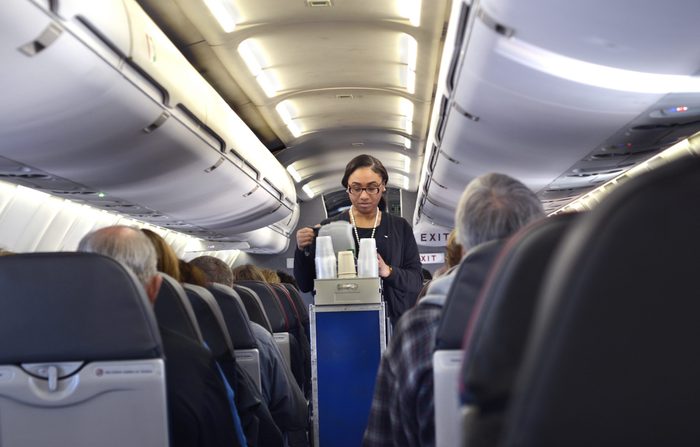
Calling them by a term of endearment
Calling someone a term of endearment can feel affectionate, playful and more personal than “sir” or “ma’am.” Plus, who doesn’t like to be told they are gorgeous or a sweetheart? Well, a lot of people, actually, including retail workers and people in most other professional settings. “Passengers calling me ‘darling,’ ‘honey’ or ‘sweetie’ is my biggest pet peeve as a flight attendant,” says Tania. These terms of endearment may sound sweet, but they often come across as patronizing or flirtatious. Think of it this way: It’s basically the equivalent of having a client call you a pet name during a meeting. At best, it’s jarring; at worst, it’s sexual harassment.
Do this instead: Call the flight attendant by the name on their badge, or simply say “Excuse me, ma’am/sir.”
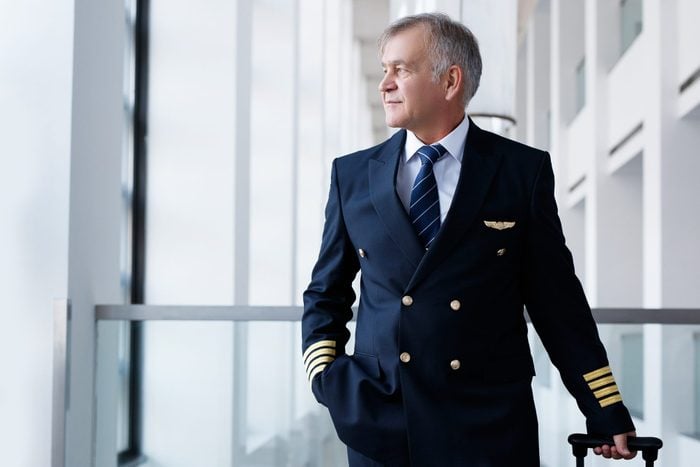
Thanking the pilot at the end of the flight
“One of the most satisfying parts of my job is getting to say goodbye to passengers as they disembark, but it feels bad when they don’t even nod or wave in return,” says Erica. “Even worse is when they make sure to tell the pilot, ‘Thank you for a great flight,’ and then completely ignore those of us who did all the work to make it great for them.”
Do this instead: Avoid this etiquette mistake by thanking everyone on your way off the plane for their help and hard work.
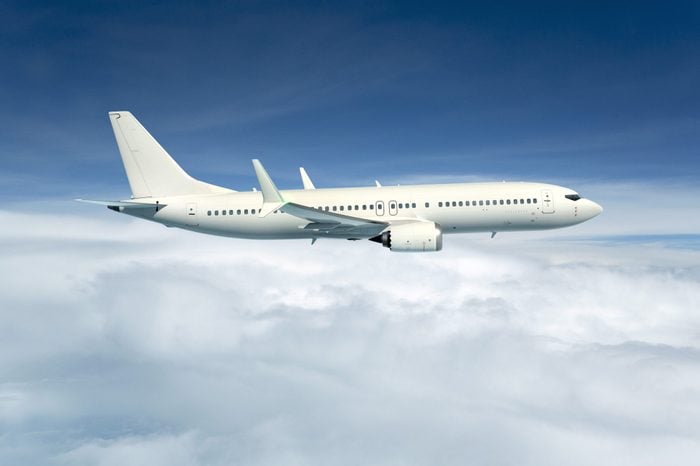
More midflight missteps
While the examples we listed above rank among the most common missteps passengers make, there are plenty of other little things you might want to think twice about. Here’s what else made our flight attendants’ list of things to avoid:
- Folding the tops of all the barf bags closed. (“It looks so much neater this way!”)
- Trying to wash a dirty airline blanket in the lavatory sink.
- Leaving little pieces of candy tucked into areas of the seats for children on the next flight to find. (“It’s like a fun scavenger hunt!”)
- Offering a “tip” that looked like a $100 bill but was actually pretend money printed with a Bible verse.
- Asking the flight attendant if they’d like to try a bite of the passenger’s burger.
- Offering free manicures with nail polish they’d brought onboard.
Now that you know which habits aren’t as polite as they seem when flying, find out whether it’s acceptable to give a gift to a flight attendant.